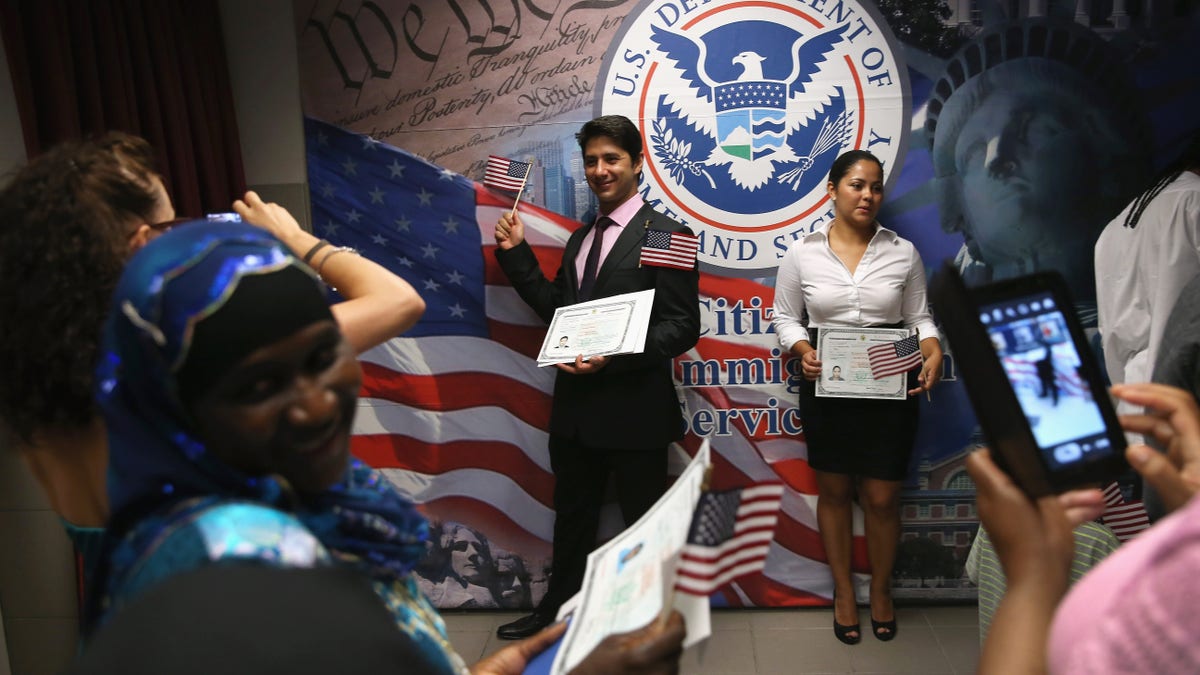
NEW YORK, NY - AUGUST 16: New American citizens pose for photos following a naturalization ceremony on August 16, 2013 in New York City. Some 154 immigrants from 58 countries became American citizens at the ceremony held by the U.S. Citizenship and Naturalization Services (USCIS) in downtown Manhattan. (Photo by John Moore/Getty Images) (2013 Getty Images)
In the end, the California Supreme Court’s decision to grant a law license to Sergio Garcia, an unauthorized Mexican immigrant, was all but a foregone conclusion. Garcia, a law school graduate who came to the U.S. illegally with his parents when he was a child, went on to complete high school, college and law school in the U.S. But after he passed the California Bar Examination his admission was stalled by a provision in the federal immigration law which restricts undocumented immigrants from obtaining professional licenses issued by state agencies. Garcia refused to take “No” for an answer and, with the aide of counsel, valiantly argued that the federal provision—section 1621 of the federal immigration code—didn’t apply to California State Bar admissions.
The exceptional nature of America is the result of hard working immigrants, including promising undocumented immigrants like Sergio Garcia who may lack immigration documents, but know in their hearts that they too have a place in the American family.
The California Supreme Court heard arguments late last summer and was gearing up to resolve the complicated legal issue when California Governor Jerry Brown signed legislation passed by the legislature which amended the law to permit the admission of undocumented immigrants to the California Bar. The statutory tweak, which went into effect on January 1, 2014—the day before the California Supreme Court decided Garcia’s case—satisfied a provision in the federal immigration law which permitted undocumented immigrants to obtain professional licenses where state law “affirmatively provides for such eligibility.”
The resolution of Mr. Garcia’s case—the result of the collective wisdom of the California legislature, the Governor, and the state Supreme Court—shows there is a growing recognition among policy makers and jurists that undocumented youth who have been raised and educated in the U.S. are the product of our investment in the future of the Nation. Educated in our schools they have become an intrinsic part of America’s social fabric. Certainly the inability to earn lawful immigration status—because of the jumble of rules and regulations known as the Immigration and Nationality Act—should not prevent a talented lawyer or other professional from being licensed to serve his or her community.
Yet the outcome of the Mr. Garcia’s case, as wonderful as it is for him and other undocumented Californians who aspire to be lawyers, does not solve the problem for other undocumented professionals across the country. In places like Arizona, Alabama, and Georgia, where legislatures and governors have cynically fanned the flames of fear, the result has been enactment of mean spirited anti-immigrant laws arguably intended to chase away Latino residents. What about aspiring attorneys and other professionals in those states? There are thousands of undocumented youth, who like Sergio Garcia, dream of becoming licensed doctors, lawyers, engineers so they can give back to the only country they know and struggled against all odds to enrich. But can anyone imagine Arizona Governor Jan Brewer following Governor Brown’s lead by signing a bill founded on the belief that promising undocumented youth should not be stymied by a rigid and unworkable federal immigration law?
To be sure, there are other states where, like California, the legislatures and governors recognize that undocumented youth, raised and educated in this country, should not be punished because they lack immigration paper work. Just this week New Jersey Governor Chris Christie signed a bill extending in-state tuition benefits in public universities to undocumented students.
In the absence of immigration reform the states are taking action, some with an eye toward integration and others with an eye toward expulsion, to fill the vacuum left by the federal government. But is this state-by-state imbalanced approach any way to run a supposedly federally controlled immigration policy?
As the GOP controlled House of Representatives dithers on immigration reform, allowing itself to be held captive by extremists in the party, a hodgepodge of state immigration rules continues to develop from state to state. Should undocumented immigrants—or lawful immigrants for that matter—be treated better or worse depending upon where they happen to live? Is a promising undocumented law graduate in California more worthy of a law license than a promising undocumented law graduate in Florida? Shouldn’t there be uniform opportunity and civic responsibility for all?
The California Supreme Court’s decision in Sergio Garcia’s case will hopefully serve as a lesson to the entire Nation. America’s strength is its openness, its celebration of creativity and new ideas. The exceptional nature of America is the result of hard working immigrants, including promising undocumented immigrants like Sergio Garcia who may lack immigration documents, but know in their hearts that they too have a place in the American family.








































